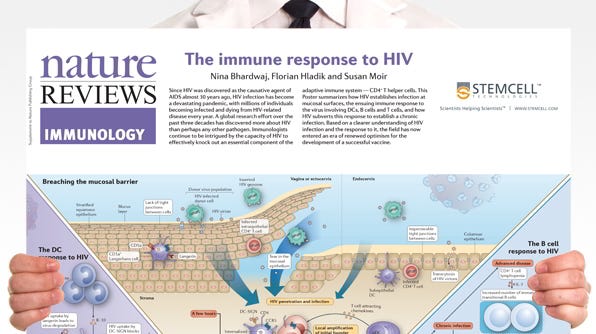Infectious Diseases and Immunology
Infectious diseases are caused by pathogens, including viruses and bacteria. Researchers aim to understand the interactions between these microorganisms and immune cells in order to develop vaccines and therapies against infectious diseases.
Below is a collection of scientific resources for your infectious disease research.
The Immune Response to HIV Poster
Nina Bhardwaj, Florian Hladik and Susan Moir. This Poster summarizes how HIV establishes infection at mucosal surfaces, the ensuing immune response to the virus involving DCs, B cells and T cells, and how HIV subverts this response to establish a chronic infection.
Get Your Free Copy >-
 "Innate Immune Receptors" Featuring Dr. Jenny TingOn this episode of the Immunology Podcast, Dr. Jenny Ting discusses her research on oxidative phosphorylation in HIV, the role of AIM2 in autoimmunity, and microbes that can protect from radiation.
"Innate Immune Receptors" Featuring Dr. Jenny TingOn this episode of the Immunology Podcast, Dr. Jenny Ting discusses her research on oxidative phosphorylation in HIV, the role of AIM2 in autoimmunity, and microbes that can protect from radiation. -
 Tools for Optimizing Human Immune Cell ResearchObtaining consistent and reliable results when culturing immune cells can be challenging. Watch this webinar to discover how to obtain high yields of functional T cells, NK cells, B cells, dendritic cells, and macrophages for your research applications. The speaker, Evan Karas, also explains how to expand primary T cells without feeders or serum.
Tools for Optimizing Human Immune Cell ResearchObtaining consistent and reliable results when culturing immune cells can be challenging. Watch this webinar to discover how to obtain high yields of functional T cells, NK cells, B cells, dendritic cells, and macrophages for your research applications. The speaker, Evan Karas, also explains how to expand primary T cells without feeders or serum. -
 SnapShot: COVID-19Overview of the life cycle, viral structure, and human immune response to SARS-CoV-2
SnapShot: COVID-19Overview of the life cycle, viral structure, and human immune response to SARS-CoV-2 -
 "Plasmodium Infection" Featuring Drs. Judy Lieberman and Caroline JunqueiraOn this episode of the Immunology Podcast, Drs. Judy Lieberman and Caroline Junqueira discuss the role of γδ T cells in malaria.
"Plasmodium Infection" Featuring Drs. Judy Lieberman and Caroline JunqueiraOn this episode of the Immunology Podcast, Drs. Judy Lieberman and Caroline Junqueira discuss the role of γδ T cells in malaria. -
 The Immune Response to HIV PosterSummary of how HIV subverts the immune response to establish a chronic infection
The Immune Response to HIV PosterSummary of how HIV subverts the immune response to establish a chronic infection -
 Ramin Herati, MDDr. Ramin Herati discusses his work on understanding the mechanism and regulation of T cell exhaustion during chronic infections and cancer
Ramin Herati, MDDr. Ramin Herati discusses his work on understanding the mechanism and regulation of T cell exhaustion during chronic infections and cancer -
 Asier S√°ez-Ciri√≥n, PhDDr. Asier S√°ez-Ciri√≥n discusses his research on HIV infection, with a focus on understanding how some patients have the ability to control HIV infection
Asier Sáez-Cirión, PhDDr. Asier Sáez-Cirión discusses his research on HIV infection, with a focus on understanding how some patients have the ability to control HIV infection -
 Andreia Costa, BScAndreia Costa describes her work in the Lund lab investigating the role of regulatory T cells in neurotophic infections
Andreia Costa, BScAndreia Costa describes her work in the Lund lab investigating the role of regulatory T cells in neurotophic infections -
 Cori FainCori Gain discusses her work in the Johnson lab focused on understanding immune-mediated blood-brain barrier disruption in cerebral malaria
Cori FainCori Gain discusses her work in the Johnson lab focused on understanding immune-mediated blood-brain barrier disruption in cerebral malaria




